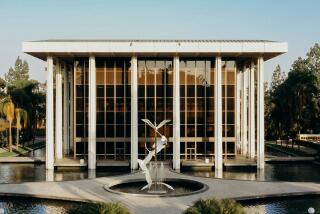No More Encores : Weekly Organ Concerts Ending After 2 Decades
- Share via
There was standing room only at Spud Koons’ Long Beach motorcycle shop Sunday afternoon.
Leaning on the walls and sitting in folding chairs spread over the grease-stained floor, more than 300 music lovers listened raptly as Del Castillo, 96, played for more than two hours on a 10-rank Welte organ, one of the largest of its kind in Southern California and one of only a handful still playing anywhere.
For 20 years, the organ in the motorcycle shop has been entertaining packed houses for free every Saturday night and occasionally on Sundays for a modest admission price. Now all that is ending.
Faced with failing health, declining business profits and a local ordinance that would require her to make expensive earthquake modifications, the instrument’s 71-year-old owner, Spud Koons, is selling her shop to investors who plan to convert it into a retail mini-mall. Sunday was the final concert as the instrument’s many admirers crammed into the shop decorated with daffodils for an emotional farewell.
‘End of an Era’
“I’m devastated,” said Donna Phillips of Los Angeles, a longtime regular. “You can’t get music like this anywhere else.”
Said Shirley Swan, an organ aficionado from Brentwood: “It’s the end of an era. It’s a very sad loss.”
The pipe organ has a colorful history, stemming from the early tinkerings of Koons’ late husband, Joe, who opened the motorcycle shop in 1949. In 1956, she recalls, he traded in the family’s tiny spinet Hammond organ for a full-sized instrument.
Thus began a lasting obsession. Over the next few years, Joe Koons added chimes, a rhythm box, red and green lights under the keyboards and, finally, a large cymbal controlled by a mechanism he built from the parts of an old motorcycle.
Eventually, Joe got interested in pipes, abandoning the Hammond altogether in favor of the a huge Welte organ that once resided in the lounge of the swank Del Mar Club in Santa Monica.
Moved to Motorcycle Shop
In 1967, Joe Koons moved his musical contraption to the motorcycle shop so he could work on it full time. And today, after much tinkering, the organ’s innards--consisting of more than 2,000 pipes and relays that can simulate the sounds of clarinets, violins, drums, French horns, sirens, sleigh bells, xylophones, fire gongs and boat whistles, among others--are housed in three large chambers covering the entire back wall of the shop’s 120-foot-long service garage. The three-tiered console is located on a raised platform across the concrete floor.
Spud Koons, who does not play the organ herself but has opened its keyboard to artists from all over the world, began managing the weekly concerts after her husband died of a stroke in 1978. The concerts began after friends and customers asked to hear the giant Welte play. The family began opening the shop to organ-lovers on Saturday nights, an event that soon became a tradition.
Late Sunday, however, the fate of the legendary instrument was still uncertain. Up for sale since early last month, the organ would cost about $100,000 to relocate--in addition to the $75,000 purchase price. Although Koons says she has spoken to representatives of various cities, universities and hotels about taking it over, no firm deal has yet been struck. In fact, she said, she’s not even sure yet where the instrument will be stored.
“We have to start dismantling it next Sunday,” Koons said, “so I hope we have a place by then.”
For a time on Sunday, though, worry seemed far away as listeners applauded and cheered Castillo’s harmonic renditions of such old favorites as “Showboat” and “Carmen Suite.”
While some audience members rhapsodized between numbers about the glory of the instrument that may soon become history, one of the least sentimental about its imminent demise was the organist himself.
A 1914 graduate of Harvard, Castillo has played big organs many times before, including several appearances with the giant Welte. Although he admitted to being fairly “unemotional about organs,” Castillo, too, was moved by the sadness of the moment.
“I think its a shame,” he said. “It’s one of the nicest, nicest installations in Southern California.”
More to Read
The biggest entertainment stories
Get our big stories about Hollywood, film, television, music, arts, culture and more right in your inbox as soon as they publish.
You may occasionally receive promotional content from the Los Angeles Times.










